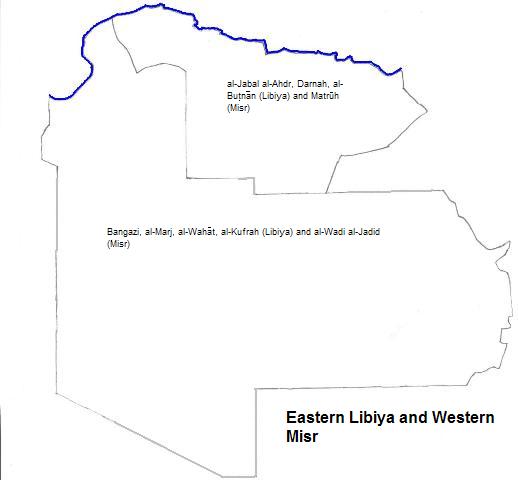
| To Duval Family Home Page | Africa | |
| To Chris Home Page | the Maghreb | |
| To Earth (Geography Home Page) | Libiya (Libya) | |
| Misr (Egypt) |
Most of the land consists of a large chunk of the Sahara
Some interesting features of the desert include: I. the Qattara Depression in northwest Egypt; II. the El Harga Oasis in southern Egypt; III. the Siwa Oasis in northwest Egypt; and IV. the Sirte Desert which reaches the Mediterranean Sea and divides habitable Libya in two--only part of it is within this area. Most of the desert is duller--a windy, dusty plateau of rock (hamada) and gravel (areg).
This is within the part of north Africa in which speakers of Maghrebi
There is one city of over a million residents: بنغازي (Banghazi).
The great city of the past is Κυρήνη (Kurene or Cyrene), now the town of شحات (Shahhat), a World Heritage Site.
Another place of tourist interest is the Siwa Oasis in western Egypt.
There is an oil port at Qaṣr al Burayqah.

Thousands of years ago, according to Christopher Ehret, speakers of the Boreafrasian dialects of Afroasiatic moved here when the climate was wetter, giving rise to the Berber languages.
The Punic people's colonized cities along the seashore as did the Greeks in Libya. Later the Roman conquerors introduced Latin and their conquerors introduced a Germanic language. All ethnic traces of these peoples has vanished. These people introduced new religions: the Punic people worshipped gods under generic names like Baal, El or Meloch; the Greeks worshipped gods like Zeus, Athena, Aphrodite and Poseidon; the Romans initially worshipped gods like Jupiter, Juno and Apollo, and later became Christians. North African Christian had great diversity in belief and so the Roman and Byzantine Empire treated them viciously as heretics, setting the stage for a big switch.
The Arabs conquered the region in the seventh century and changed the majority language and religion.
Turks ruled the coasts loosely in the early 19th century but have left no traces.
Euopeans conquered the area by the early 20th century, but largely departed in the second half, leaving only handfuls of native Italian and English speakers, but the languages persist in administration and international relations.
Jews settled here during the Roman Empire, then left for the most part when Israel
north
east
southeast
south
west
1. Libya in English, Libia in Italian.
2. Bengazi in transliterated English.
3. Translates from Arabic as mountains.
4. Egypt in English.
5. Translates as river or gully.
6. Translates from Arabic as wilderness.
7. Maghrebi means western in Arabic.
8. Some would consider this several languages, others would subsume it under Arabic.
9. Yisrael in transliterated Hebrew.